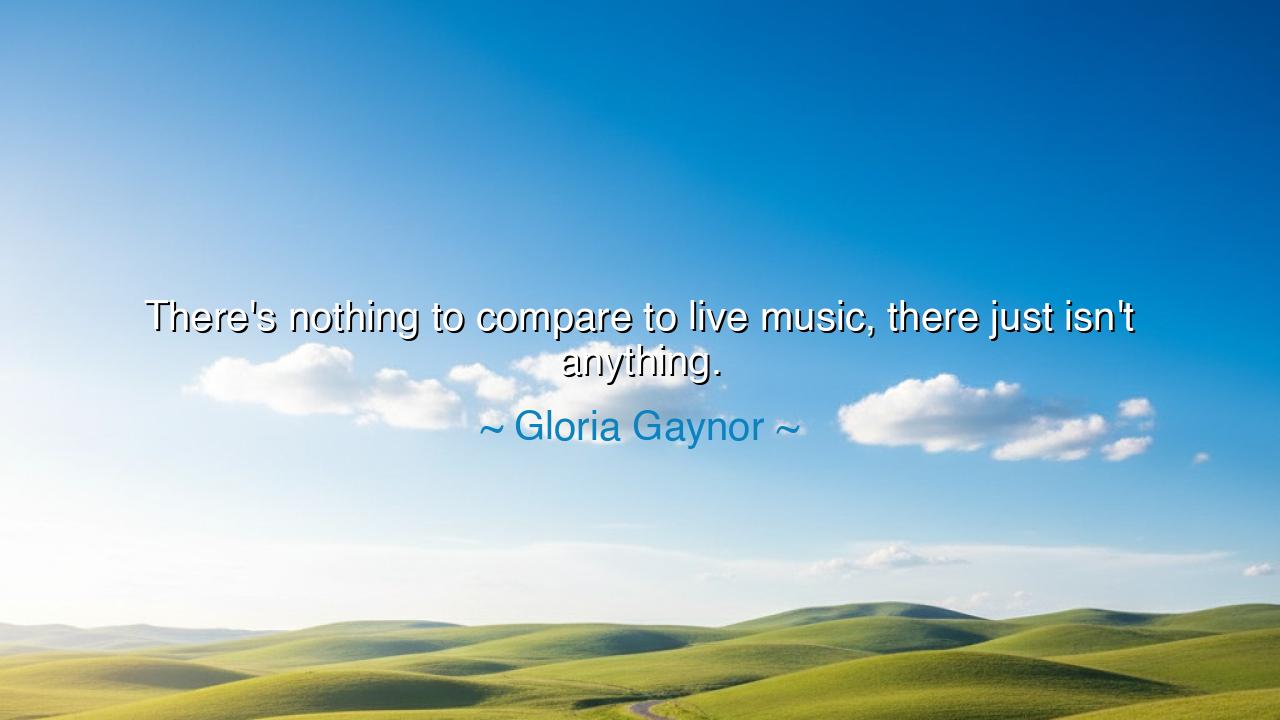
There's nothing to compare to live music, there just isn't






Gloria Gaynor once declared: “There’s nothing to compare to live music, there just isn’t anything.” These words ring not as idle sentiment, but as a truth ancient as the human spirit itself. For from the dawn of time, before written words carved meaning into clay and stone, it was the song—the living breath of melody—that carried stories across generations. The drumbeat in the dark, the voice rising with firelight, the rhythm echoing through valleys and temples—these were the first bindings of community, the first sparks of transcendence. Live music is not mere entertainment; it is the pulse of the soul made manifest, the language beyond words.
Why does live music stand above all else? Because it is alive. A song on a page is like a statue—beautiful, but unmoving. A recording, though powerful, is but a shadow of the living flame. When instruments sound in the presence of beating hearts, when voices rise together in the same air, something awakens that no imitation can capture. The ancients knew this: the Greeks gathered in amphitheaters not merely to listen, but to be transformed. The Hebrews sang psalms not as recitation, but as communion with the divine. Across all lands and peoples, live music was never background—it was the bridge between the mortal and the eternal.
Consider the story of Beethoven. By the end of his life, he was deaf—unable to hear the very symphonies he composed. And yet, when his Ninth Symphony was performed for the first time, the hall thundered with such energy that even he, cut off from sound, turned to see the audience in rapture. They wept, they shouted, they applauded without end. Though he could not hear, he could feel the power of live music shaking the human heart. It was not sound alone, but the shared moment of creation, the union of performer and listener, that birthed transcendence that night. That is why Gaynor’s words ring with such clarity: there is nothing to compare.
For live music is not merely notes, nor even the skill of the performer. It is the invisible bond forged between those who give and those who receive. When the singer pours out their spirit, when the crowd breathes in unison, when silence itself trembles before the first note, there arises a presence beyond measure. This is why armies marched to drums, why revolutions were stirred by songs, why lovers remember forever the tune played in their hour of union. Music, alive and unchained, is the closest mankind has come to touching eternity.
And yet, in our modern age, many forget this. We place earphones in our ears, we consume music like water from a bottle—useful, refreshing, but tamed. We forget the fountain, where water bursts forth untamed and pure. Live music is that fountain. It demands presence. It demands participation. It shakes the bones and stirs the blood in a way no device can replicate. When Gaynor spoke, she reminded us that music is not meant to be caged—it must be lived, shared, breathed in the same moment of time.
What lesson, then, shall you take? Seek out live music. Do not let your soul be starved by only shadows of song. Go to the concert hall, the humble tavern, the street corner where a stranger strums a guitar. Let the sound wash over you, not as consumer, but as participant in something larger than yourself. Sing with others, play if you can, and remember that music is not perfect because it is alive—and in its imperfection lies its divine power.
Practical wisdom follows: at least once each month, place yourself in the presence of live music. Support those who carry the flame, for they are keepers of the sacred fire. And more than that—lift your own voice. Even if untrained, even if unpolished, sing. For when you give sound to the spirit within you, you partake in the oldest and holiest act of humankind. And as Gaynor knew, in that moment, there truly is nothing to compare.






AAdministratorAdministrator
Welcome, honored guests. Please leave a comment, we will respond soon